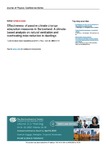Effectiveness of passive climate change adaptation measures in Switzerland: A climate-based analysis on natural ventilation and overheating risks reduction in dwellings

Use este enlace para citar
http://hdl.handle.net/2183/30237Colecciones
- Investigacion (ETSAC) [510]
Metadatos
Mostrar el registro completo del ítemTítulo
Effectiveness of passive climate change adaptation measures in Switzerland: A climate-based analysis on natural ventilation and overheating risks reduction in dwellingsFecha
2021-11-18Cita bibliográfica
Zepeda Rivas, Daniel, Sergi Aguacil Moreno, Jorge Rodríguez Álvarez. "Effectiveness of passive climate change adaptation measures in Switzerland: A climate-based analysis on natural ventilation and overheating risks reduction in dwellings". Journal of Physics: Conference Series 2042 (2021): 012151
Resumen
[Abstract]
Building energy codes have been implemented in Switzerland as well as across the world to reduce building energy consumption, however, due to the progressive effect of climate change phenomena and the precipitate change in occupancy patterns due to the global pandemic, their effectiveness and limitations must be constantly re-examined. This paper explores the effectiveness of natural ventilation as a passive cooling strategy, as well as the overheating patterns in dwellings across the Swiss territory. The work is based on a climate-based simulation model at a territorial scale, from which the building performance is further analysed considering the heating energy consumption and overheating risk hours above 26.5°C. The effectiveness of natural ventilation through the operable window operable area in reducing overheating risk was also estimated. The results show the effectiveness across the whole territory of the current regulation (SIA 380/1:2016), which is focused on the performance of the building envelope to reduce heat losses. An unattended alarming overheating pattern was spotted in locations with altitudes below 1500 meters as a direct consequence of the climate change phenomena, hence a series of recommendations are proposed to update and improve the current legal requirements.
Palabras clave
Building energy codes
Climate change
Adaptation
Energy performance
Overheating risk
Climate change
Adaptation
Energy performance
Overheating risk
Descripción
Incluído en el número especial: CISBAT 2021 Carbon-neutral cities - energy efficiency and renewables in the digital era 8-10 September 2021, EPFL Lausanne, Switzerland.
Versión del editor
Derechos
Atribución 3.0 España
ISSN
1742-6588





